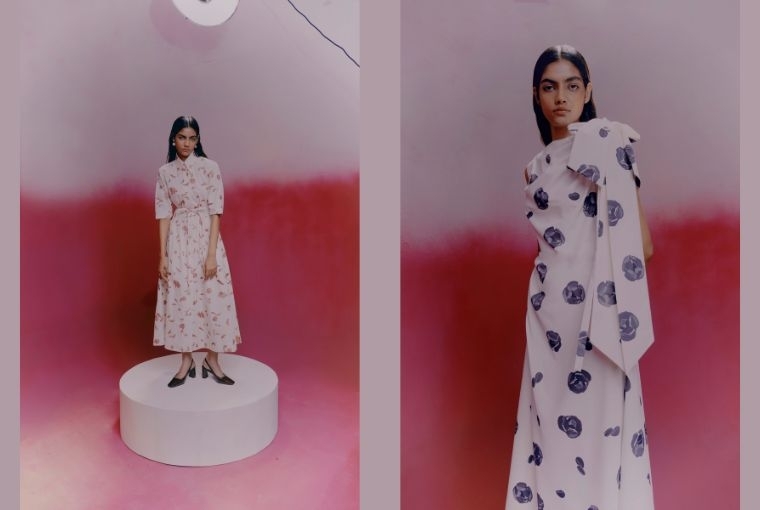

KIRU is a new clothing and jewellery label founded by designers Sonia Ali and Zain Noori. It is described as 'a quiet, intentional offering' born out of their 'deep love for craft, care, and the emotional weight of making.' The brand spans both clothing and jewellery and was conceived 'not from trends but from feelings.' Nothing is mass-produced; every piece is, as they put it, 'made to order, made to the body, and made with time.' KIRU positions itself as 'a rebellion against rushed fashion' and an ode to those who value presence in their clothes and connection in how they’re made.
KIRU’s debut collection, The First Gesture of Love, unfolds 'like a whispered memory, slow, textured, and instinctive.' It explores the earliest, tender moments of love. Think of 'a gaze held a moment too long, the warmth of a borrowed sweater, the way someone fixes your collar without saying a word.' Each garment and jewel in this collection is part of that rhythm of intimacy, fragility, and strength sitting side by side. Through these pieces, the designers remind us that 'what we wear can hold meaning.'

The phrase 'The First Gestures of Love' emerged early in KIRU’s creative process as an 'emotional compass.' This concept helped capture the spirit of small, often overlooked acts of care: adjusting a hem, sewing a loose button, or saving a scrap of fabric or a cracked stone because it felt too precious to let go. The design process began with Sonia Ali’s visual diary, filled with brushstrokes, scribbled lines, loose painted sheets, pressed flowers, and fabric swatches. These quiet beginnings became the foundation of the collection. Some of the initial artworks were 'revisited, torn, re-layered, reworked until they held the right energy, not just the right form.' In essence, the collection became 'a meditation on the unspoken'.
Even the name KIRU holds layered significance that reflects the label’s approach. In Japanese, kiru means 'to cut, to carve, to wear', a concise phrase that encapsulates the entire design philosophy. In clothing design, the journey begins with the cut of fabric to shape a silhouette; in jewelry, it starts with a raw gem being carefully carved and refined. The act of carving, they note, is 'not just technical, it’s emotional.' It involves 'the pause, the decision, the instinct that makes a piece feel human.' Staying true to this philosophy, KIRU eschews standard sizing. Every garment is a 'one-of-one' piece, shaped to the wearer so that it 'fits like it was always meant to be yours.' The aim is, as the founders say, 'not mass but meaning.' And finally comes 'to wear', that moment when the piece leaves the hands of the maker and becomes part of your story.

KIRU’s signature style arises from a seamless conversation between textile and jewellery. The collaboration between these two disciplines is described as 'a conversation between rhythm and restraint, fluid and fixed.' In practice, a hemline on a garment can echo the curve of a carved ring, and the fold of fabric might hold the weight of a pendant. The two mediums don’t compete; they respond to each other, textile drapes while jewellery grounds, one moves and the other holds. This balanced exchange creates an intimacy in each piece, making the final piece feel whole. The effect can be seen in the silhouettes: for instance, a tailored shirt may feature undone cuffs, or a dress might let light through while still holding its shape.
A deeply tactile experience is another hallmark of KIRU’s work. The designers believe that 'touch is how memory begins,' so they choose natural, textured fabrics like raw linen, layered cotton, and faded threads, materials that 'age well, carry warmth, and soften with time.' Each piece is finished by hand, with embroidery that mimics diary scribbles, clean French seams, and wrapped closures or hidden buttons that make the experience feel intimate.
Ali and Noori hope a KIRU piece gives the owner a feeling of 'presence,' a 'quiet sense of being held.' It should be 'not just an object to wear, but something you return to when you need softness, when you want strength, or when you simply want to feel like yourself again.' Every creation is made with intention and care, carrying 'the weight of many hands and the whisper of many gestures.' 'It’s not about fashion, it’s about feeling,' the founders emphasize. If one of their creations 'feels like home, no matter where you are, then we’ve done what we came here to do,' they conclude.
Text Harita Odedara
16.06.2025